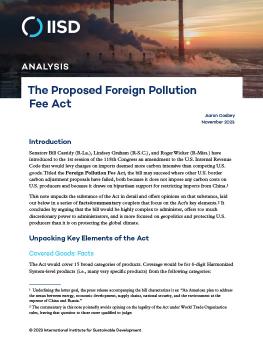
The Proposed Foreign Pollution Fee Act
The recent amendment to the U.S. Internal Revenue Code, the Foreign Pollution Fee Act, proposes charges on carbon-intensive imports. This analysis delves into the bill's details, expressing concerns about its complexity, excessive discretionary power, and a perceived emphasis on geopolitics over global climate protection.
-
Aaron Cosbey analyzes the proposed #ForeignPollution Fee Act, emphasizing its challenges in administration, the excessive discretionary powers, and its focus on geopolitical interests over global climate protection.
-
U.S. legislators aim to align #TradePolicy with climate goals through the Foreign Pollution Fee Act. However, @AaronCosbey's analysis highlights complexities, excessive discretion, and geopolitical priorities that could hinder its effectiveness in addressing global #climatechange.
-
With a focus on protecting U.S. producers, does the Foreign Pollution Fee Act truly prevent carbon leakage, or could it inadvertently hinder global efforts to mitigate climate change? @AaronCosbey unpacks the key elements of the Act.
In the realm of U.S. legislative initiatives addressing climate change and trade policy, Senators Bill Cassidy (R-La.), Lindsey Graham (R-S.C.), and Roger Wicker (R-Miss.) have introduced the Foreign Pollution Fee Act. This legislative proposal aims to levy charges on imports with higher carbon intensity than their U.S. counterparts. The bill has garnered attention for its potential to succeed where other border carbon adjustment proposals have faltered. However, this analysis reveals complex administrative challenges, broad discretionary powers, and a focus on geopolitical positioning and protecting domestic industries over global climate mitigation.
Participating experts
You might also be interested in
CSDDD: EU's Due diligence law vote should drive supply chain sustainability efforts
The European Parliament has voted to adopt the Corporate Sustainability Due Diligence Directive, aiming to address the environmental and social impacts of the supply chains of Europe's large corporations.
IISD: EU’s historic Energy Charter Treaty vote will boost energy transition
The European Parliament has voted for the European Union to withdraw from the climate-threatening Energy Charter Treaty.
Why Blaine Higgs's 'big picture' emissions plan faces long odds
Canadian premier's vision of selling LNG to Europe to close coal plants faces local and global obstacles.
Blackouts and Backsliding: Energy subsidies in South Africa 2023
Blackouts and Backsliding presents the latest energy subsidy data for South Africa.